- Why a “nexus” approach to transboundary cooperation?
-
The “nexus” term in the context of water, food and energy refers to these sectors being inextricably linked so that actions in one policy area commonly have impacts on the others, as well as on the ecosystems that natural resources and human activities ultimately depend upon.
Demographic, economic, social, and climatic changes, are all exerting increasing pressure on natural resources, including through a seemingly ever-growing global demand of energy, food, and water that threatens the well-being of the ecosystems we rely upon. The key to shift towards sustainable development lies in the strategic decisions we will take regarding natural resources, which need to be better valued and more responsibly managed.
Today, choices related to management and use of energy, land, and water are typically taken in isolation and without adequate consideration of the inter-sectoral implications of planned developments, which may be positive or negative. This can result in painful inter-sectoral trade-offs and makes it more difficult to find collaborative solutions . Both developing and developed countries are faced with this challenge.
In transboundary settings, not addressing trade-offs and externalities may result in friction between countries and reduced trust, at best hindering regional development and at worst generating conflict. Conversely, a nexus (or cross-sectoral) approach to managing common resources could greatly enhance water, energy and food security in riparian countries, including by: increasing resource use efficiency, capitalizing on regional complementarities, and improving natural resource governance.
For more information on applying a nexus approach to transboundary cooperation, this brochure summarizes the experience of the Water Convention. - Nexus activities under the Water Convention
-
In 2012, the Meeting of the Parties to the Water Convention decided to carry out an assessment of water-food-energy-ecosystems nexus in selected transboundary basins. The period 2013-2015 saw the development of the Transboundary Basin Nexus Assessment (TBNA) methodology to carry out participatory assessments of nexus issues in transboundary contexts and its first applications. The assessments sought to jointly identify intersectoral issues in the respective transboundary basins and to address them through concrete policy solutions to be applied at regional, basin, country, and local levels.
The experience from the first three river basin assessments (the Alazani/Ganykh in the Caucasus, the Sava in the Western Balkans, and the Syr Darya in Central Asia) was summarised in a dedicated publication in 2015 and in a brochure. A global stocktaking workshop was organized in 2016 in Geneva to share lessons learned from this experience and that of other organizations and experts involved in similar work.
Between 2016 and 2018 the methodology was reviewed based on feedbacks from countries and experts, particularly for its governance aspects. Two more river basin assessments were initiated (Drina and Drin, in the Western Balkans), and for the first time the methodology was applied to a shared aquifer and in Africa (the North-West Saharan Aquifer System). The revised methodology and a synthesis of lessons learned from applications was published in 2018.
In 2021, the Water Convention published a stocktaking of “nexus solutions and investments” transboundary relevance from the experience of nexus dialogues and assessments around the world.In 2022, a graphic leaflet on the Transboundary Nexus Assessment Methodology was published, with the aim to facilitate its broader uptake and use by partners carrying out similar work.
- Task Force for the Transboundary Nexus
-
The Task Force on the Water-Food-Energy-Ecosystems Nexus was established in 2013 to gather interested policy makers, practitioners and experts, and to oversee the nexus assessment carried out under the Convention. Today, this is a well-established global platform -- accessible to Parties and other States -- to exchange their knowledge and experience on transboundary nexus issues and solutions, particularly when it comes to questions of public policy and regional cooperation.
The nexus Task Force meets regularly:- First meeting 8-9 April 2013
- Second meeting 8-9 September 2014
- Third meeting 28-29 April 2015
- Fourth meeting 8 December 2016
- Fifth meeting 18 October 2017
- Sixth meeting 22-23 October 2020
- Seventh meeting 12-13 December 2022
- Eight meeting 7-8 December 2023
The nexus assessment meaningfully supports and informs other activities of the Water Convention and other partners inside the UNECE, notably by linking to the Group of Experts on Renewable Energy under the Committee on Sustainable Energy, with whom the Water Convention has raised awareness and developed guidance on how to sustainably deploy renewable energy accounting for inter-sectoral and transboundary issues.
UNECE is supporting countries to address key sustainable development challenges through an integrated, multisectoral approach leveraging UNECE norms, standards and conventions, and by building capacities and providing policy assistance. One of these high-impact “nexus” areas identified where multiple Sustainable Development Goals converge is Sustainable use of natural resources . The Water Convention actively contributes to work of this cross-divisional Cluster team. - Renewable energy in transboundary basins
-
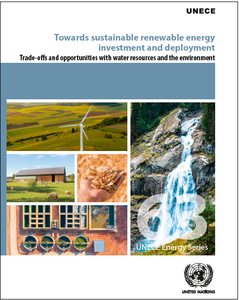
Building on the Water Convention’s nexus work, the UNECE proposes a “tool-kit” for sustainable renewable energy. “Towards sustainable renewable energy investment and deployment: Trade-offs and opportunities with water resources and the environment” is a joint publication of the Environment and Sustainable Energy Divisions. Energy-related objectives can be achieved more effectively through integrated and consultative planning. Policy makers need to ensure that the objectives of all sectors are considered and reduce pressure on the environment, also through the development of synergies (e.g. wastewater valorization, sustainable biomass). The relevance of the links was illustrated with the brochure “Deployment of Renewable Energy: The Water-Energy-Food-Ecosystem Nexus Approach to Support the Sustainable Development Goals”, launched at the 8th International Forum on Energy for Sustainable Development (June 2017, Astana).
Given its focus on synergies with water and agriculture, this approach is promoted in the ESCWA-UNECE brochure "Tools for the Water-Energy Nexus" specifically targeted to the largely water-scarce Arab region, which also draws from the experience from the nexus assessment in the North Western Sahara Aquifer System.
- Methodology for participatory nexus assessments of transboundary basins
-
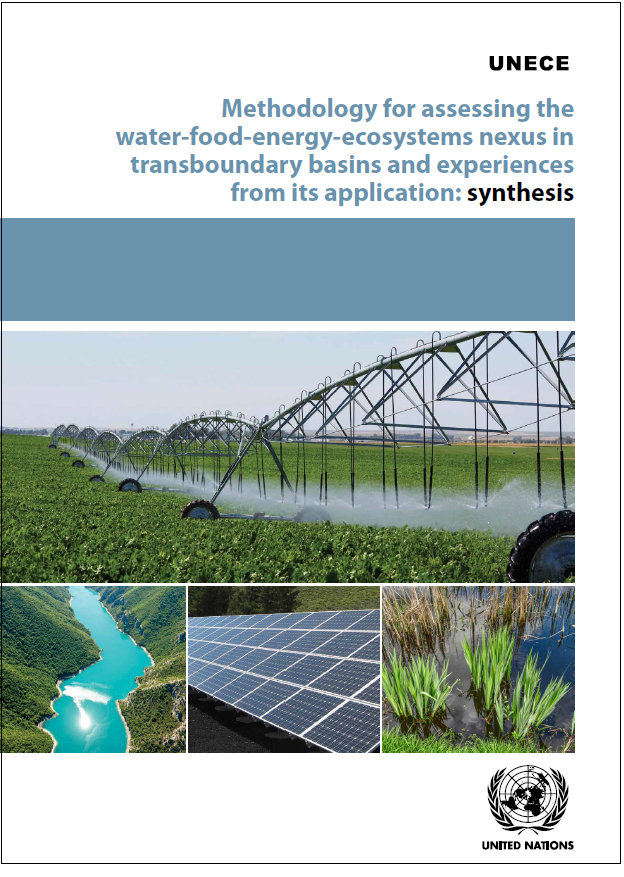 Nexus assessments under the Water Convention aim at identifying, together with the concerned sector authorities and key stakeholders, 1) intersectoral issues which represent negative impacts or inefficiencies but also provide opportunities for additional benefits from working across sectors, and 2) practical solutions for improving resource security, sustainable development and for reconciling the different sectors’ needs.
Nexus assessments under the Water Convention aim at identifying, together with the concerned sector authorities and key stakeholders, 1) intersectoral issues which represent negative impacts or inefficiencies but also provide opportunities for additional benefits from working across sectors, and 2) practical solutions for improving resource security, sustainable development and for reconciling the different sectors’ needs.
The process has been designed to ensure ownership by the authorities, meaningful participation of a variety of stakeholders, learning together and exchanging experience between basins. Ultimately, the process should lead to the establishment, broadening, or enhancement, of mechanisms of intersectoral and transboundary cooperation.The basin assessment processes included participatory workshops, produced publications and supported a variety of transboundary cooperation activities.
A step-be-step description of the methodology for nexus assessments can be browsed or downloaded as a Leaflet (in English, French, Russian, and Spanish).For more details, the synthesis publication on the methodology and its application can be referred to.
- Cross-sectoral solutions and investments with transboundary benefits
-
How can governments, other public and private actors learn about and better understand the water-energy-food-ecosystems nexus? How can they use a ‘nexus approach’ to address the most pressing issues in transboundary water basins? How can they design and implement ‘nexus’ solutions and investments that create synergies and provide transboundary benefits?
The publication ‘Solutions and investments in the water-food-energy-ecosystems nexus: A synthesis of experiences in transboundary basins’, which takes stock of the experience of policymakers, basin organizations, financial institutions, and practitioners around the world. Drawing from several case studies, the publication proposes directions to concretely improve cross-sectoral cooperation in transboundary contexts, with a focus on financing and enabling environments.
Basin nexus assessments
To browse material about specific basin assessments carried out by Water Convention secretariat in cooperation with partners, click the tabs below.
Each assessment focused on specific issues of importance for the basin, and involved a tailored participatory process. For a visual overview of a typical assessment, check the on-line story map developed in cooperation with GRID-Arendal with support of the GEF International Waters Learning Exchange and Resource Network).
- Drin River Basin
-
Drin River Basin shared by Albania, Kosovo*, Montenegro, and North Macedonia
* (UN administered territory under Security Council resolution 1244, 1999)Issues in focus:
Hydropower, floods, biomass for energy and sustainable forestry, rural/agricultural development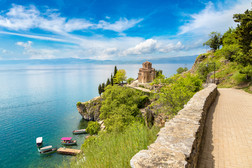
In 2011, the five riparians signed a Memorandum of Understanding committing to a Shared Strategic Vision for the Sustainable Management of the Drin River basin. To support their cooperation, the project “Enabling transboundary cooperation and integrated water resources management in the extended Drin Basin” funded by the Global Environmental Facility/UNDP is implemented by the Global Water Partnership Mediterranean in partnership with UNECE.
The first phase of the nexus assessment of the Drin has contributed to the Transboundary Diagnostic Analysis (TDA) of the basin and to the development of the Strategic Action Programme (SAP), a political document providing the basis for deepening of the transboundary cooperation, which was endorsed in April 2020.
The nexus issues elaborated on in the Thematic report on the Nexus for the TDA were discussed in the Drin Core Group and in the Drin Stakeholder conferences. The second phase of the assessment included the analysis of priority nexus issues, in support to the implementation of the SAP, in particular regarding synergies with economic sectors and making a case for broader participation across sectors in taking strategic actions.
Through the project “Promoting the Sustainable Management of Natural Resources in Southeastern Europe, through the use of the Nexus approach”, funded by the Austrian Development Agency (ADA), UNECE and GWP-Med supported analytical work aimed to study the potential impact of:- Increased cooperation along the two hydropower cascades for improved flood risk management, and
- The economic, environmental, and social impact of upgrading and modernizing the wood biomass value chain in the framework of sustainable forest management.
The project also supported a Drin Nexus Roadmap to operationalize the SAP from a nexus perspective; two project documents for nexus investments, one in Nature Based Solutions for wastewater treatment, and one for Sustainable Biomass; as well as capacity building activities on nexus (more information available on the GWP SEE Project webpage).
Drin Nexus Assessment Phase I Thematic report on the Nexus for the TDA Drin Nexus Assessment Phase II - Factsheet Drin Nexus Assessment Phase II - Summary Albanian Drin Nexus Assessment Phase II - Summary English Drin Nexus Assessment Phase II - Summary Macedonian Drin Nexus Assessment Phase II - Summary Montenegrin Drin Nexus Assessment Phase II Drin Nexus Roadmap - Drina River Basin
-
Drina River Basin shared by Bosnia and Herzegovina, Montenegro, and Serbia
Issues in focus:
Hydropower, renewable energy, rural/agricultural development, water quality, benefits of cooperation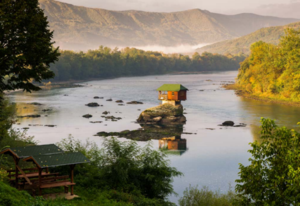
The Drina River Basin is a sub-basin of the Sava, already the focus of an earlier nexus assessment. Its assessment focused on specific topics of interest for basin stakeholders, namely:
Co-optimisation of flow regulation; Integrated rural development through eco-tourism, agriculture, renewable energy; Protection of water quality and improvement of waste management; and Basin-level governance to maximise benefits for the countries across sectors.The project also supported a Drina Nexus Roadmap to enhance cross-sectoral cooperation around specific objectives, two project documents for nexus investments (the outline of a climate adaptation strategy and a plan for improved sediment management), and capacity building activities on nexus (more information available on the GWP SEE Project webpage).
To improve the participatory aspect of the assessment process, the Drina River Basin assessment included three basin workshops. Through this inter-sectoral and inter-national dialogue, participants found that broadening and intensifying transboundary cooperation among the three countries would bring various benefits. For example, if the use of flow-regulation infrastructure and related communications were optimized, the damage from high or low water flows could be minimized, while serving also hydropower generation (and the introduction of mechanisms for transboundary inter-agency coordination would be helpful to that end). Improving management of existing dams could improve the sustainability of hydropower operations and allow for greater integration of variable renewables in the basin. The 2016 publication illustrates these insights and demonstrates the complementarity of the nexus approach and understanding the broader benefits of cooperation.
To deepen this analysis, in 2017-2019 the assessment was followed by targeted follow-up activities responding to the interest of the countries, particularly on monitoring and exchange of information, sedimentation, flow regulation and environmental flows, as well as on renewable energy deployment and cooperation among riparians. Drawing upon technical documents prepared, lines of action and concrete recommendations were formulated, the relevance of which was politically confirmed by the riparian representatives at a high-level workshop.
Both the nexus assessment of the Drina and its follow up were supported by the Italian Ministry of Environment, Land and Sea.
In 2019-2022, another phase of transboundary dialogue on nexus issues in the basin was carried out under the project “Promoting the Sustainable Management of Natural Resources in Southeastern Europe, through the use of the Nexus approach”, supported by the Austrian Development Agency (ADA), and in collaboration with GWP-Med (also including a Nexus Assessment of the Drin River Basin). The new assessment of the Drina contained two more studies that drew from the first assessment and from the follow-up project:- Modelling energy-water for sustainable energy development
- Governance options for the formalization of flow regulation modalities in the basin
The project also supported a Drina Nexus Roadmap to enhance cross-sectoral cooperation around specific objectives, two project documents for nexus investments (the outline of a climate adaptation strategy and a plan for improved sediment management), and capacity building activities on nexus (more information available on the GWP SEE Project webpage).
Drina Nexus Assessment - Factsheet (2022) Drina Nexus Assessment - Summary English (2022) Drina Nexus Assessment - Summary Serbian (2022) Drina Nexus Assessment (2022) Drina Nexus Roadmap (2022) - North-Western Sahara Aquifer System
-
North-Western Sahara Aquifer System shared by Algeria, Libya, and Tunisia
Issues in focus:
Groundwater abstraction, groundwater quality, irrigation (including solar), renewable energy, soil salinization, rural development, agricultural transformation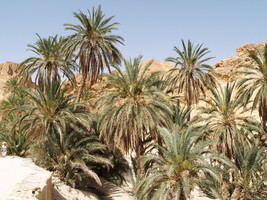
The nexus assessment of the NWSAS was carried out in cooperation with the Global Water Partnership Mediterranean (GWP-Med) and the Sahara and Sahel Observatory (OSS), in close cooperation with concerned authorities from the aquifer-sharing countries as well as with the NWSAS Consultation Mechanism. The project aimed at enhancing transboundary cooperation in the NWSAS and strengthening the capacities needed to address intersectoral issues.
The assessment started with the joint identification of issues related to groundwater in the basin as perceived by authorities and key stakeholders in water management, energy and agriculture sectors as well as in environment protection (first regional workshop), moved to an in-depth analysis of nexus issues in the single countries (and related consultations) and the elaboration of “nexus solutions” for the basin (national consultations and a second regional workshop). These solutions need to be implemented in a synergetic and cooperative way across sectors, to maximize positive impact of investments and to reduce possible trade-offs. These evolve around:
- The modernization of agriculture and the increase of its efficiency and viability, including by promoting local products and strengthening youth and women groups;
- The preservation of groundwater resources and the rationalization of water use, including with the use of unconventional waters; and
- The sustainable development of the energy sector, including by promoting renewable energies for water management and desalination.
Part A of the nexus assessment report includes the description of nexus challenges and solutions, while Part B includes detailed information on the water, energy, and land resources in the basin. Finally, a Policy Brief illustrates the benefits of cooperation in the basin.
- Syr Darya River Basin
-
Syr Darya River Basin shared by Kazakhstan, Kyrgyzstan, Tajikistan, and Uzbekistan
Issues in focus:
Flow regulation, energy production and trade, climate change, renewable energy and energy efficiency, food production and trade, regional cooperation
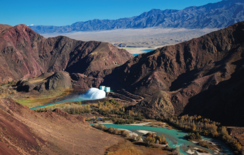
The assessment aimed to foster transboundary cooperation by identifying intersectoral synergies and determining measures that could alleviate tensions related to the multiple needs of the riparian countries for common resources. The process looked to generate relevant information to support decision-making, and it engaged diverse expertise and key actors in the basins. The participatory assessment process for the Syr Darya involved an intersectoral workshop for identification of the main intersectoral issues and possible solutions, detailed by a subsequent analysis, and followed by consultations of the various sectoral authorities concerned.
The adoption of a nexus approach to natural resource management in the basin has the potential to improve security in the riparian countries. In contrast to national approaches presently employed, cooperation involving all the countries and sectors has a great potential to optimize the use of resources in the basin. A functioning transboundary and inter-sectoral cooperation is a prerequisite for the efficient management of existing infrastructure and optimization of new investments and trade. Applying certain solutions at the country level – including, among others, improvement of efficiency in water and energy use, as well as well-targeted economic and policy instruments – can gradually build more favourable conditions for transboundary cooperation.
The assessment was carried out with the support of Finland.
The nexus assessment in the Syr Darya Basin has been providing insights into developing future directions for intersectoral work in the framework of the UN Special Programme for the Economies of Central Asia (SPECA), notably reflection about a regional Strategy on Water, Energy and Environment (under the SPECA Working Group on Water, Energy and Environment ) as well as trade-agriculture-water-environment links relevant for the SPECA Working Group on Trade. - Sava River Basin
-
Sava River Basin shared by Bosnia and Herzegovina, Croatia, Montenegro, Serbia and Slovenia
Issues in focus:
Hydropower, renewable energy, land use, irrigation, environmental needs of water, navigation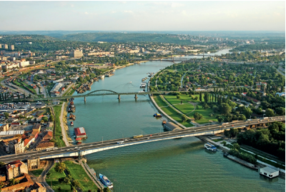
In the Sava Basin, the assessment exercise contributed to further integration of water policy with other policies and further dialogue with the key sectoral stakeholders, as specific objectives in river basin management defined in the Strategy on Implementation of the Framework Agreement on the Sava River Basin. The process helped to broaden the stakeholder involvement in the framework of the International Sava River Basin Commission (ISRBC).
The assessment illustrates the value of transboundary cooperation for balancing between increasing energy generation, the ambitious regional climate and energy policy targets and maintaining a good status of shared waters. A more systematic use of policy instruments, reliable data and information gathering as well as coordination of investments into infrastructure and promoting multiple and flexible use of infrastructure were among the key recommendations. Furthermore, using ISRBC as a platform to discuss all the relevant basin resources and for a consultation process to review the impact of national and sectoral development strategies was also recommended. - Alazani/Ganykh River Basin
-
Alazani/Ganykh River Basin shared by Azerbaijan and Georgia
Issues in focus:
Rural/agricultural development, flash floods, hydropower, energy trade, erosion and sedimentation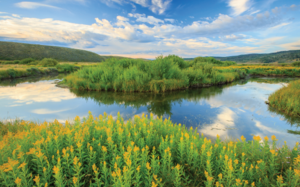
The assessment of the Alazani/Ganykh was carried out as a pilot, to test the Transboundary Basin Nexus Assessment (TBNA) methodology. The process initiated a dialogue that helped stakeholders to form a holistic picture of the challenges in the basin, and to identify integrated inter-sectoral solutions that could generate benefits in both riparian countries.
One basin level workshop was organized involving key economic sectors, notably agriculture and energy, as well as water and environment administrations, companies and civil society representatives. There, participants engaged enthusiastically in group discussions on inter-sectoral issues and brainstormed on possible solutions. For instance, they found that improving access to modern energy sources would limit the use of fuel wood in rural households, which would complement reforestation efforts aimed at reducing erosion, exposure to flood damage and biodiversity loss.

